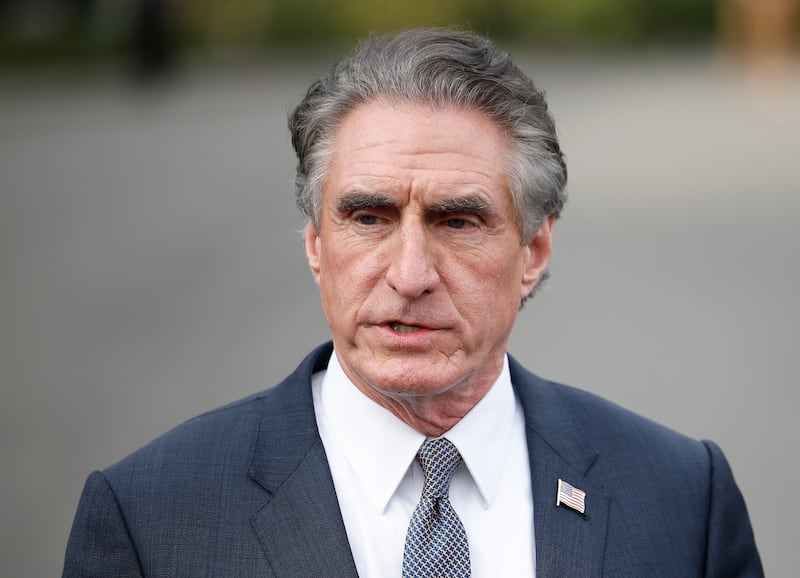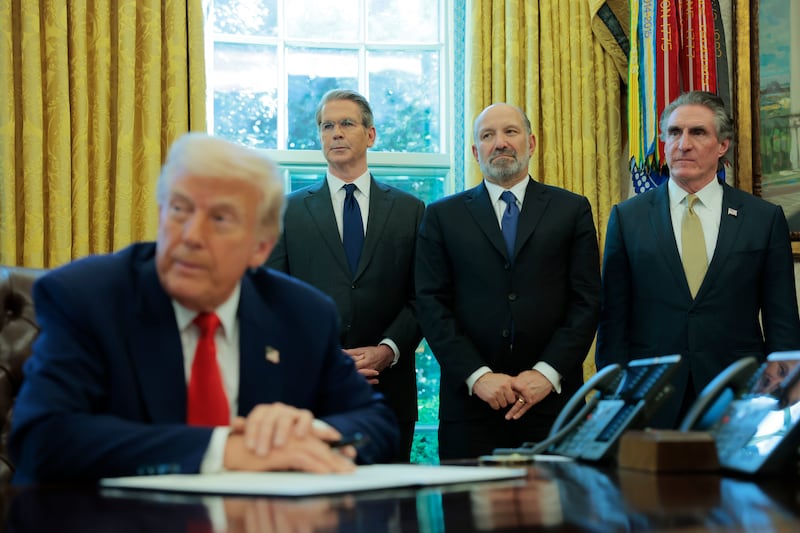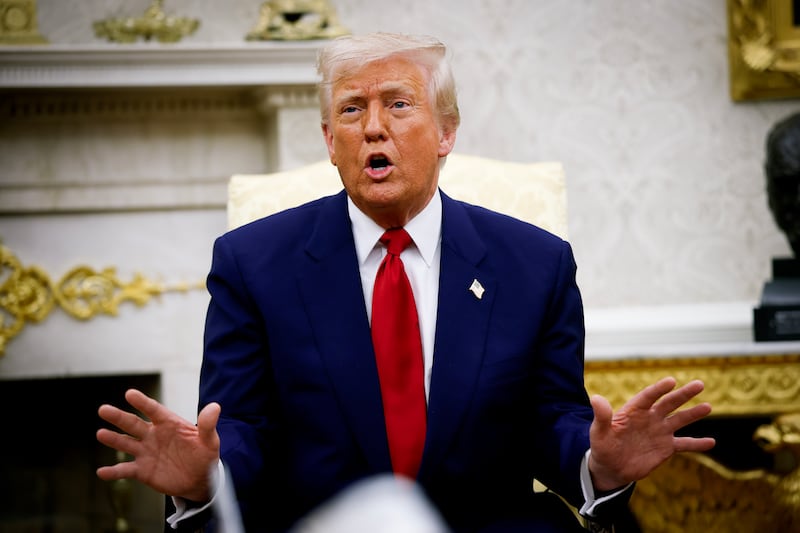The Trump administration wants to forgo endangered species protections—and is hinging its argument on a wild vision of the future straight out of a science fiction novel.
This week, a biotechnology company claimed to have brought back the long-extinct dire wolf using new gene editing technology, and the breakthrough has Secretary of the Interior Doug Burgum thinking outside of the box.
Why protect endangered species, he argued, when you can use “innovation” to simply bring them back from the brink of death instead?
On Monday, Time magazine published a revelatory report detailing Colossal Biosciences’ supposed successful bid to create three dire wolf puppies through gene editing. The Dallas-based company has named the pups Romulus, Remus, and Khaleesi, and have touted their future aspirations to bring back versions, not exact replicas, of other long-extinct animals like the dodo and the mammoth.
Their efforts did not go unnoticed by Burgum, who cited the claimed revival of the species that went extinct over 10,000 years ago as proof that “it has been innovation — not regulation — that has spawned American greatness.”

“The Department of the Interior is excited about the potential of ‘de-extinction’ technology and how it may serve broader purposes beyond the recovery of lost species, including strengthening biodiversity protection efforts and helping endangered or at-risk species,” Burgum wrote in an X post Monday.
“The Endangered Species List has become like the Hotel California: once a species enters, they never leave … This is because the status quo is focused on regulation more than innovation,” he continued. “It’s time to fundamentally change how we think about species conservation. Going forward, we must celebrate removals from the endangered list – not additions. The only thing we’d like to see go extinct is the need for an endangered species list to exist.
“We need to continue improving recovery efforts to make that a reality, and the marvel of ‘de-extinction’ technology can help forge a future where populations are never at risk,” he added.
The mission of the U.S. Fish and Wildlife Service is to work with others to “conserve, protect, and enhance fish, wildlife, plants, and their habitats for the continuing benefit of the American people.”The Department of the Interior is excited about the potential of…
— Secretary Doug Burgum (@SecretaryBurgum) April 7, 2025
The secretary parroted similar talking points during a town hall Wednesday where he reiterated, “If we’re going to be in anguish about losing a species, now we have an opportunity to bring them back. I mean, pick your favorite species and call up Colossal.”
“Instead of raising money to get animals on the endangered species list, let’s figure out a way to get them off and this is one tool,” he continued.
Colossal’s CEO Ben Lamm told The Washington Post in a report published Thursday that Burgum had already met up with the company’s leaders in March to discuss “de-extinction.”
“It’s really important to have a seat at the table regardless of your political views,” Lamm told The Post. “Is it really the right thing just to put your head in the sand and ignore the rest of the world?”

Alongside spearheading a tariff turnover this week, President Donald Trump has also taken aim at a handful of environmental policies and regulations he deems a hindrance to energy production.
In one executive order signed Tuesday, Trump ordered Attorney General Pam Bondi to “stop the enforcement of State laws” pertaining to climate change to pave way for “American energy dominance” instead.
“Many States have enacted, or are in the process of enacting, burdensome and ideologically motivated ‘climate change’ or energy policies that threaten American energy dominance and our economic and national security,” the executive order read.
“These State laws and policies are fundamentally irreconcilable with my Administration’s objective to unleash American energy,” it continued. “They should not stand.”

In another executive order Wednesday, Trump ordered agencies including the Environmental Protection Agency, Energy Department, Nuclear Regulatory Commission, and several subdivisions within the Department of the Interior (which fall under Burgum) like the Fish and Wildlife Service and Bureau of Safety and Environmental Enforcement to “sunset” regulations pertaining to energy production.
“By rescinding outdated regulations that serve as a drag on progress, we can stimulate innovation and deliver prosperity to everyday Americans,” Trump wrote in the order, describing the United States’ energy landscape as “perpetually trapped in the 1970s.”
Julie Meachen, a Des Moines University paleontologist who helped uncover the dire wolf genome but was not involved in Colossal’s project to birth the three pups, told The Post she worries that the Trump administration will hinge on de-extinction “as a carte blanche to delist all the endangered species.”
“This technology does not replace protections for endangered species,” Meachen told the publication.
The post Team Trump: Why Protect Endangered Species When We Can Just Bring Them Back Later? appeared first on The Daily Beast.



















